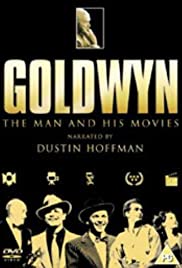
GOLDWYN: THE MAN AND HIS MOVIES
US, 2001, 118 minutes, Colour.
Narrated by Dustin Hoffman.
Directed by Mark Catalina, Peter Jones.
A commentator, focused on the power of words, was critical of a documentary by saying that it offered nothing more than what could be found in Wikipedia. While the Wikipedia articles are quick references and contain substantial information (with some limitations), the visuals of a documentary and hence the words, offer portraits of the subject, newsreel footage and background, talking heads and opinions, and, with somebody involved in cinema, clips from their films.
This is the case with this substantial biography of producer Samuel Goldwyn. It is based on a biography by A.Scott Berg, who appears throughout the film with substantial and intelligent comment.
Goldwyn is one of those Jewish émigrés from Eastern Europe who settled in the United States, became interested in early cinema, capitalised, became heads of studios and famous producers: Adolf Zukor, Carl Laemle, Louis B.Mayer, Jack Warner. And Samuel Goldwyn who was never accepted as part of the established producers.
The film gives his background, family background in Poland, his migration to the United States, his ability to make do, his involvement in glove-making and the prospect of a successful career in this industry. However, he saw some early movies and was entranced. A link with Jesse Lasky led to Cecil B De Mille, loans, the making of films, urging De Mille to move into movies. Goldwyn always remained on the outside, was antagonistic to some of the other producers, especially Mayer (and was not happy with the Goldwyn name as part of MGM).
Goldwyn was not an easy man, not always a pleasant man, difficulties in marriage, but in the 1920s, marrying a Catholic young woman, Frances, staying married to her for many decades, eventually buried beside her. The couple were caught up in his career and business, she always a charming hostess to support her husband, neglecting their son Samuel Goldwyn Jr and their daughter RuthCapps?. Both of them appear in this film, offering substantial comment about their parents, the filmmaking, their own lives. Samuel Goldwyn Jr’s wife also appears as do other friends including producer, Arthur Hornblow and his wife. Goldwyn’s secretary also offers opinions.
While there is substantial material on Goldwyn as a person, the focus is on his career, ups and downs, feeling an outsider, commercial difficulties, setting up his studios, the distribution of his films. While he made a number of silent films, he was careful not to make a huge number of films each year. This documentary shows his work with Eddie Cantor in 1930 with Whoopee. He made a number of substantial dramas during the 30s and there are scenes from Doddsworth as well as Stellar Dallas (and comments that he liked this story, something of compensation from the neglect of love from his mother).
He was nominated for an Oscar for best film several times, including for The Little Foxes (with Bette Davis a talking head in this film), for Pride of the Yankees (this film also featuring Teresa Wright as a talking head). Ultimately, working with playwright Robert Sherwood, he tapped into the post-war experience with The Best Years of Our Lives (1946).
There is some comment that Goldwyn was not always in touch with popular sensibilities, especially after the war, success with The Bishop’s Wife and, especially, the comedy is with Danny Kaye, lack of success with some RKO melodramas including Edge of Darkness. However, he produced a big budget Hans Christian Andersen as well as encouraging Marlon Brando to sing in Guys and Dolls. His last film, Oscar-awarded but not popular at the box office, was his version of the Gershwin’s Porgy and Bess.
The film traces the latter years of his life, retirement, illness, the support of his wife, his death in bed at the age of 94.
There are quite some comments about his use of language and the frequently quoted items such as a verbal contract is not worth the paper it is written on.
An interesting feature in retrospect is that while many filmmakers and actors testified at the time of the House of Un- American Activities and the anti-Communist drive, he was assertive against this attack on Civil Liberties.
Which means that this documentary, unobtrusively narrated by Dustin Hoffman, is an interesting, entertaining and overview of Hollywood, especially during the first half of the 20th century.